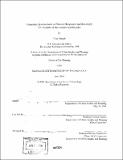| dc.contributor.advisor | JoAnn Carmin. | en_US |
| dc.contributor.author | Sayegh, Tracy, 1976- | en_US |
| dc.contributor.other | Massachusetts Institute of Technology. Dept. of Urban Studies and Planning. | en_US |
| dc.date.accessioned | 2005-06-02T18:20:22Z | |
| dc.date.available | 2005-06-02T18:20:22Z | |
| dc.date.copyright | 2004 | en_US |
| dc.date.issued | 2004 | en_US |
| dc.identifier.uri | http://hdl.handle.net/1721.1/17708 | |
| dc.description | Thesis (M.C.P.)--Massachusetts Institute of Technology, Dept. of Urban Studies and Planning, 2004. | en_US |
| dc.description | Includes bibliographical references (p. 110-114). | en_US |
| dc.description.abstract | Disaster vulnerability is a serious issue in developing countries where globalization, development patterns, poverty and environmental degradation are placing more people at risk to natural disasters. Recent appeals for greater multi-sectoral collaboration to tackle complex disaster situations have raised the need for private sector participation in disaster management. The private sector is already beginning to play more engaged roles in disaster response and recovery on a voluntary basis, yet limited understanding currently exists about their activities in this area. Given the problem of rising vulnerability to natural disasters and the emergence of increased private sector involvement in disaster activities, this thesis seeks to understand: 1) why firms become involved in disaster response and recovery on voluntary (i.e. philanthropic) terms; and 2) the nature and implementation of corporate initiatives in this context. To illustrate private sector motivations and roles in the disaster response and recovery, the study focused on corporate responses to the Gujarat Earthquake in India in 2001. The research was informed by concepts of corporate social responsibility (CSR). The analysis produced three sets of findings, based on in-depth interviews with national and multinational companies which responded to the Gujarat Earthquake. The research indicates that corporations are motivated to become involved in disaster response and recovery based on six organizational factors: social values, disaster sensitivity, internal organization, external pressures, and perceived benefits. | en_US |
| dc.description.abstract | (cont.) These dimensions expand our prior understanding of corporate motivations which focuses primarily on organizational benefits and stakeholder expectations, and introduces the critical influences of social values, commitment to philanthropy, and resource availability and relevancy. The research also identifies differences in the nature of response versus recovery initiatives. In terms of disaster response, companies pursued unilateral disaster response activities, often implementing large-scale, top-down relief and infrastructure-oriented initiatives. Corporations coordinate with the government and leverage their internal resources for response, but do not emphasize community participation in their approach. In contrast, recovery initiatives were focused on participatory, community-oriented reconstruction and livelihood-generating programs. Recovery efforts tended to be structured as formal, collaborative partnerships with NGOs, wherein both parties play complementary roles in implementation. The analysis further reveals the differences between national and multinational corporate efforts in disaster response and recovery. | en_US |
| dc.description.statementofresponsibility | by Tracy Sayegh. | en_US |
| dc.format.extent | 114 p. | en_US |
| dc.format.extent | 5050838 bytes | |
| dc.format.extent | 5050647 bytes | |
| dc.format.mimetype | application/pdf | |
| dc.format.mimetype | application/pdf | |
| dc.language.iso | eng | en_US |
| dc.publisher | Massachusetts Institute of Technology | en_US |
| dc.rights | M.I.T. theses are protected by copyright. They may be viewed from this source for any purpose, but reproduction or distribution in any format is prohibited without written permission. See provided URL for inquiries about permission. | en_US |
| dc.rights.uri | http://dspace.mit.edu/handle/1721.1/7582 | |
| dc.subject | Urban Studies and Planning. | en_US |
| dc.title | Corporate involvement in disaster response and recovery : an analysis of the Gujarat Earthquake | en_US |
| dc.type | Thesis | en_US |
| dc.description.degree | M.C.P. | en_US |
| dc.contributor.department | Massachusetts Institute of Technology. Department of Urban Studies and Planning | |
| dc.identifier.oclc | 56417007 | en_US |
